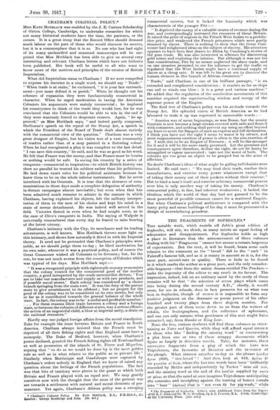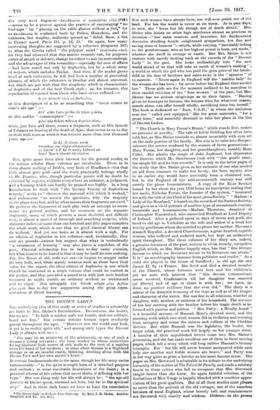THE FRAGMENTS OF SOPHOCLES.•
Tars notable work, which rounds off Jebb's great edition of Sophocles, will stir, we think, in many minds an equal feeling of admiration and disappointment. For Sophocles holds so high a place in literature that the announcement of three volumes dealing with his " Fragments " cannot but arouse a certain largeness of expectation. But the text, it will be found, bears some such relation to the comment as the " bread " did to the " sack " in Falstaff's famous bill, and as it is scanty in amount so it is, for the most part, second-rate in quality. There is little to be found in it which marks the author as a great poet, and the only consider- able fragment—that from the satiric drama entitled The Trackers— tasks the ingenuity of the editor to say much in its favour. The impression, indeed, left on an ordinary mind by the study of these remains will be that " the selection of seven plays which came into being during the second century A.D.," chiefly, it would seem, for use in schools, does in fact preserve for us what was best in Sophocles, though of course it is impossible to form any positive judgment on the dramatic or poetic power of his other hundred and twenty plays from these disjecta mcmbra. For the greater part of them come down to us from the writers of scholia, the lexicographers, and the collectors of aphorisms, and one can only surmise what gentlemen of this sort might have extracted, say, from Hamlet or King Lear.
None tho less, curious students will find these volumes as enter- taining as Notes and Queries, while they will afford equal interest to those who like " finding the missing word " or constructing a plot from one or two of those scrappy documents which figure so largely in detective novels. Take, for instance, three successive fragments from a play of which tho hero was Triptolemus, the favourite of Demeter and the in vcntor of the plough. What interest attaches to-day to the phrase dpiv37v dprov (009), " rice-bread " ! And then look at 010, fip■frov de 711Y xrpsaiov ou dear, where the last two words have been " brilliantly emended by Mekler and independently by Tucker " into olio irclv, and the missing word at the end of the iambic supplied by Torla or faiXor, so that the mind at once imagines Triptolemus anticipating the centuries and inveighing against the turning of honest cereals into " beer " (ptikrea) that is " not even fit for pig-wash," while • The Fragments of Sophocles. FAlite.1, with Additional Notes from the Papyri of Sir A. C. Jebb and Dr. W. 0. licadiam, by A. C. Pearson, 3I.A. 3 vole. Cambridge : at the University Press. [43a. net.) 61 IV, c TIKVOP, ,cep,, &Epa-Sane rev rIpliar thAayovalroo 4.4 Nivros• .3) 8' 4' ev triairce 71/440ovo-ci pet lo-stv''Ftnvbs i5opsis iftivAirov.
But, quite apart from their interest for the general reader, to the serious scholar these volumes are invaluable. There is in them almost nothing of Jobb's, very little of Headlam's—but that little almost pure gold—and the work practically belongs wholly to Mr. Pearson, who, though particular points will no doubt be criticized by experts, exhibits everywhere an industry, a judgment, and a learning which can hardly be praised too highly. In a long Introduction he deals with " the literary history of Sophoclean tragedy," seeks to " discover the material with which it worked," slut endeavours " to answer the questions, why the majority of the plays were lost, and by what means their fragments survived." Ile prefaces the fragments of each play with an attempt to recon- struct its general outline, and his comment on the separate fragments, many of which present a most doubtful and difficult text, is almost a marvel of thorough and searching exegesis, while elaborate indices of more than one hundred and fifty pages complete the whole work, which is one that no good classical library can do without. And yet one looks at it almost with a sigh. For an edition of Sophocles in ten vohmaes—and, incidentally, they cost six pounds—cannot but suggest that what is undoubtedly " a monument of learning " may also prove a sepulchre of the poet. Classical scholarship has in fact to-day many enemies, but what is most to be feared is that it may be itself its own undoing. For, like Rome of old, male reit sue—it begins to stagger under its own bulk, and, while stately octavos such as these have their value for the expert, the ideal edition of Sophocles is one which should be contained in a single volume that could be carried in the pocket, and that provided a sound text with just such briefest comment as might enable an ordinary student to understand and to enjoy. But unhappily the Greek adage Ihe'rz f4t,3Mor ply, KaKtfr has to-day few supporters among the great repre- sentatives of Greek learning. the very next fragment—ebree8chaeror of rparetoPrat &Act Ott ), —seems to be a protest against the practice of encouraging " ao heel-taps " by " placing on the table glasses without a foots" for so dirupatisigros is explained both by Pollux, Hesychius, and the unknown, but weighty, authority quoted as " Schol. Hom. A 031 in Cramer awed. Paris III. p. 10, 11." Or again, how many interesting thoughts are suggested by a reference (fragment 307) to what the Greeks called " the polypus' mind " (roXierooes eber), for Choy had observed that this marine creature can, for purposes either of attack or defence, change its colour to suit its surroundings, and the advantages of this versatility—especially for men of affairs —had been noted not only by Sophocles, but by a whole array of writers, which includes Pinder. And then, if the reader grows tired of such curiosities, he will find here a number of proverbial phrases, of which the substance is familiar and almost universal, but which are put with that fine simplicity which is characteristic of Sophocles and of the best Greek style ; as, for instance, this repudiation of counsel from those who have never suffered :—
SI to) virovOe rat pouXcarw, or this description of a lie as something that " never comes to time's old age "
• oNev fpret Orloos Eir Tripas xpiSsora or this sadder " commonplace "
• yap drapes 76Xcnor ci-yfid;ety while, just here and there, comes a fragment, such as this lament of Tolamon on hearing of the death of Ajax, that seems to us to-day as fresh with tears as when it was written more than two thousand years ago



































 Previous page
Previous page